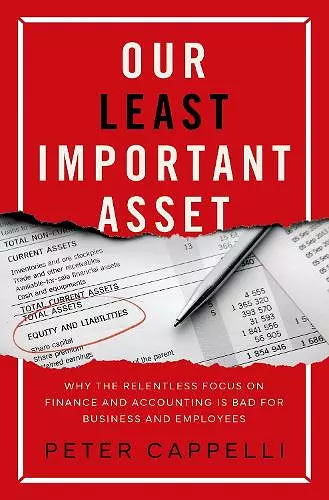Our Least Important Asset
Why the Relentless Focus on Finance and Accounting is Bad for Business and Employees
Format:Hardback
Publisher:Oxford University Press Inc
Published:18th Dec '23
Should be back in stock very soon

A comprehensive and insightful look at the modern workplace and how employees are managed, where the new approach is driven by the quirks of financial accounting to the detriment of employees and the long-term success of the organization. Real wages have stagnated or declined for most workers, job insecurity has increased, and retirement income is uncertain. Hours of work for white collar employees have increased steadily, opportunities for advancement have withered, and evidence of the negative effects of workplace stress on health continues to accumulate. Why have jobs gotten so much worse? As Peter Cappelli argues, these issues are not a result of companies trying to be cost effective. They stem from the logic of financial accounting--the arbiter for determining whether a company is maximizing shareholder value--and its fundamental flaws in dealing with human capital. Financial accounting views employee costs as fixed costs that cannot be reduced and fails to account for the costs of bad employees and poor management. The simple goal of today's executives is to drive down employment costs, even if it raises costs elsewhere. In Our Least Important Asset, Cappelli argues that the financial accounting problem explains many puzzling practices in contemporary management--employers' emphasis on costs per hire over the quality of hires, the replacement of regular employees with "leased" workers, the shift to unlimited vacations, and the transition of hiring responsibilities from professional recruiters to more expensive line managers. In the process, employers undercut all the evidence about what works to improve the quality, productivity, and creativity of workers. Drawing on decades of experience and research, Cappelli provides a comprehensive and insightful critique of the modern workplace where the gaps in financial accounting make things worse for everyone, from employees to investors.
...a timely study that connects present-day labor shortages to the dehumanizing irrationality of the modern workplace. * Publishers Weekly *
How and why are corporate jobs getting worse and worse over time? Peter Cappelli's latest book answers both these questions: corporations are pushed by accounting demands to squeeze employment costs and to rely on contractors and outsourcing to keep these costs off their books-even at the expense of HR practices supported by decades of research and experience. Our Least Important Asset is an arresting take on the source of our current employment malaise. * Jerry Davis, University of Michigan *
Human capital expert Peter Cappelli has written an important new book addressing the fundamental question of why policies that value and build human capital are not only rare in practice but increasingly implemented. His insightful answer: financial accounting measures lead to a lose-lose situation in which companies and their employees suffer. Just as the ESG movement has broadened reporting, so the answer to improved productivity and employee wellbeing must begin in changes in accounting measures. * Jeffrey Pfeffer, Stanford Graduate School of Business *
Peter Cappelli, one of the leading scholars of workforce management, offers a compelling explanation of the decline of human resource practices like careful hiring and performance evaluation and investment in training. Corporate fixation with shareholder value maximization operationalized through financial accounting practices has turned employees from a perceived asset to a liability. Cappelli's probing analysis shows that the popular bromide of convincing corporate leaders 'to do well by doing good' is not sufficient to stem the erosion of work. That makes Our Least Important Asset a must read for those who care about the future of work and workers. * David Weil, Brandeis University *
A thought-provoking and important study for managers or faculty and students in business and management programs. * Library Journal *
Cappelli's book is based on decades of research and experience in human resource management. He draws on a wealth of empirical evidence and case studies to illustrate his points. Cappelli's book is based on decades of research and experience in human resource management. He draws on a wealth of empirical evidence and case studies to illustrate his points. Highly recommended. All readership levels. * Choice *
ISBN: 9780197629802
Dimensions: 236mm x 165mm x 24mm
Weight: 481g
240 pages